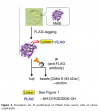Murine Rnase Inhibitors Effectively Solve the Problem of RNase Contamination
In the vast field of life science research, the stability and integrity of RNA (ribonucleic acid) is crucial to the success of many experiments. RNA, as a messenger of genetic information, plays a core role in various biological processes within cells. However, the fragility of RNA, especially its high sensitivity to ribonucleases (RNases), has been a significant challenge for researchers. RNases are a class of enzymes widely present that can catalyze the degradation of RNA into small RNA molecules, and even minute RNase contamination can lead to complete degradation of RNA samples. This degradation not only affects the accuracy of experimental results but could even lead to the failure of entire studies. Therefore, preventing RNase contamination and protecting the integrity of RNA has become a key consideration in the design of many experiments.
The Potential Role of NFAT Inhibitors in Cancer Therapy
In the complex and ever-changing field of cancer, scientists are constantly exploring new treatment strategies and targets. In recent years, NFAT (Nuclear Factor of Activated T-cells) has garnered significant attention as a potential target for cancer treatment. Particularly, inhibitors targeting NFAT, such as the VIVIT peptide, have become focal points in cancer research. As a global leader in high-performance life science products, Glpbio's exploration and innovation in this field have unveiled the immense potential of NFAT inhibitors in cancer therapy.
The Function of NFAT Inhibitors in Immune Cells
In the complex network of the immune system, NFAT plays a crucial role. NFAT regulates the transcription of numerous cytokines, chemokines, and growth factors, thereby affecting various aspects of the immune response. In recent years, inhibitors targeting NFAT, particularly the VIVIT peptide, have become important tools for studying immune cell function and developing novel therapeutic strategies. As a global leader in high-performance life science products, Glpbio plays a pivotal role in the research and application in this field. This article will delve into the functions of NFAT inhibitors in immune cells and highlight Glpbio's innovative contributions in this area.
The Far-Reaching Impact of Chlorpromazine Antagonists on Mental Health Treatment
In the field of mental health, advances in drug development and treatment methods continuously bring new hope to patients. Among them, chlorpromazine antagonists, as an important class of neuro pharmaceuticals, have played an irreplaceable role in treating psychosis and other related diseases since their inception. This article will delve into the pharmacological effects, clinical applications, and profound impacts of chlorpromazine antagonists on mental health treatment.
4 article(s)











